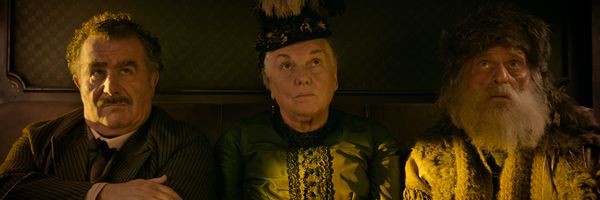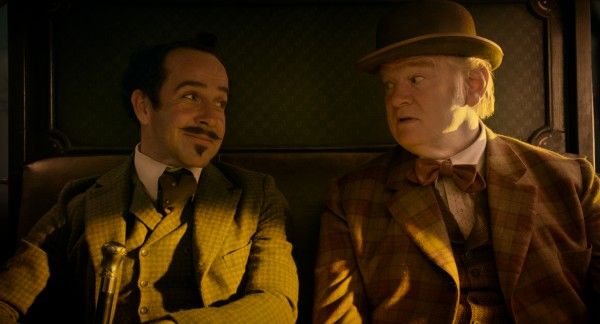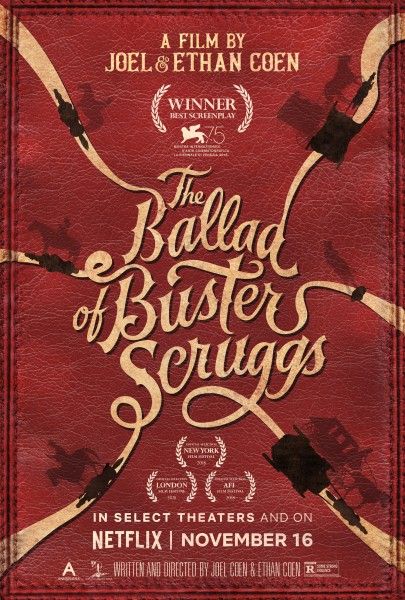Spoilers ahead for The Ballad of Buster Scruggs.
As I said in my review, The Ballad of Buster Scruggs may not be the best Coen Brothers movie, but it’s one that crystallizes their themes by using the western as a canvas for an exploration of morality and death. Buster Scruggs never tries to play it real as a historical western with real people, but rather showcases the western as it has been seen through cinema, complete with outsized characters against even larger vistas. Through the six shorts in Buster Scruggs, we can see the randomness of death and the unfairness of life, but in the final installment, “The Mortal Remains”, the Coens pull the camera way back to see a trip to the afterlife as if it were a western.
“Mortal Remains” is incredibly playful as it begins looking like a normal stagecoach ride that slowly reveals itself to be a trip to the afterlife for the Frenchman (Saul Rubinek), Lady (Tyne Daly), and Trapper (Chelcie Ross), whose souls are being harvested by the Englishman (Jonjo O’Neill) and the Irishman (Brendan Gleeson). It’s a parable that wants you to know it’s a parable, and while people die in all the other Buster Scruggs shorts, “Mortal Remains” is the only one where the characters are already dead.
It’s pretty clear that this is what the Coens are going for. They start out with a normal Western set up—a stagecoach ride—and then slowly reveal what’s actually happening. The Stagecoach driver, clad in black, is Death (“He won’t stop,” says the Englishman), the Englishman and the Irishman admit to being “Harvesters of Souls”, and the Englishman becomes offended when they’re called “Bounty Hunters” as the Trapper tries to put them back into a context he can understand. Additionally, as the segment goes on, the lighting goes from a warm glow (life) to cold and blue (death) as the souls of the Frenchmen, Lady, and Trapper cross over. Mr. Thorpe, the body on top of the stagecoach, is also crossing over, but he’s not afforded the gentleness of the journey. Finally, when they arrive at the hotel, the Frenchman, Lady, and Trapper are nervous to enter (since it’s the waypoint in the afterlife and not a normal hotel as they originally assumed) and on the inside there’s a stairway going up to a bright, unseen light.
Of course, in the other shorts, most of the characters are dead—they just don’t know it yet. Buster Scruggs (Tim Blake Nelson) will die in a gunfight; the cowboy (James Franco) in “Near Algodones” will be hanged; Alice Longabaugh (Zoe Kazan) will take her own life. The reapers are the ones who are correct that only two kinds of people are “dead or alive”, but that’s not to say they’re the only ones in the stagecoach who are right.
The members of the stagecoach all have different philosophies. The Trapper believes everyone is the same (“like ferrets”). The Lady sees people as either “Upright or sinning”. The Frenchman looks at the world and sees either the lucky or the unlucky. Furthermore, the relationships these people have are all through their perspective, and fleeting as such. The Lady views her relationship with her husband as deep and abiding while The Frenchman sees it as a joke. The Trapper thinks he had a relationship with a Sioux woman but they literally didn’t even speak the same language.
What these kinds of conversations point out is that we struggle to put everything together, but we can only do the best through our own point of view. We’re extremely confident in that point of view, and as the Englishman notes, “We love hearing about ourselves. As long as the people in the stories are us, but not us. Not us in the end, especially.” We’re all guilty of confirmation bias, and yet that will not save us. The Lady is just as dead as the Frenchman who is just as dead as the Trapper.
That’s not to say that the Coens are nihilists (“That must be exhausting,” The Dude mocks when he sees the nihilist passed out in the swimming pool in The Big Lebowski) as much as they see a world with swift repercussions but one that’s also random where the only certainty is death. And in this way, there’s something oddly life-affirming about “The Mortal Remains”. For all our different viewpoints and total certainty, we’re all going to die. That doesn’t make our lives meaningless, but we are connected in the darkest of ways. A Lady who would never cross paths with someone as rough as the Trapper still shares the same stagecoach with him. They’re still going to the same place. That doesn’t mean they’ve “figured it out”, but the destination remains the same. It’s grim, it’s darkly comic, and it’s 100% Coen Brothers.



